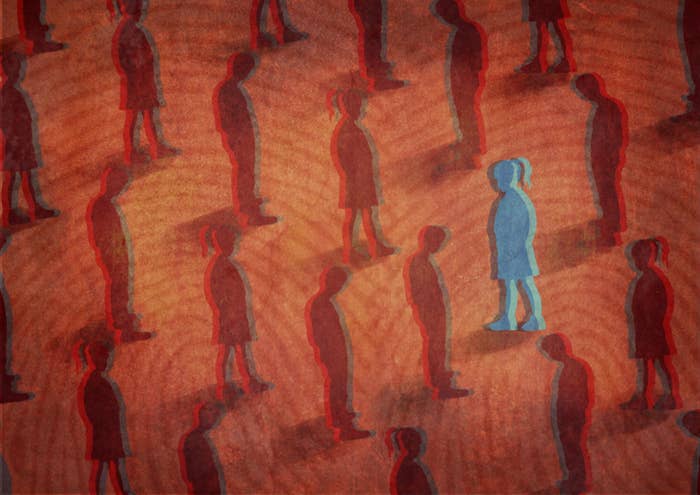
One day when I was 10 years old, I was riding my bike after school around my neighborhood in Southern California when a boy I had never seen before came up to me and kept repeating the words, "Ni hao. Ni hao." He followed me around as a I pedaled through the streets, and each time he said "Ni hao" I grew more and more embarrassed.
"Ni hao" means hello in Chinese, but I am not from China. Neither are my parents or my grandparents. But my exact heritage didn't matter to this boy, who chased me around the predominantly white neighborhood I call home. My embarrassment eventually turned into anger, so I pedaled as fast as I could until I ended up back in my driveway and crying in my mom's arms.
Seven years later I'd like to say that my experiences have shifted, that growing up alongside aware and educated peers lessened my exposure to both inherent and blatant examples of racism, but that's not exactly the case. Being a 17-year-old first-generation Korean-American in a predominantly white, upper-middle class Christian high school has its benefits, which is why I'm there in the first place. But more often than not I feel isolated, alone, and hurt by offensive comments and racial slurs.
My mom moved to the United States when she was in junior high school. Her grandfather — who was taking care of her at the time in Korea — died, so she moved here to live with her aunts and uncles. My dad immigrated to the U.S. during his college years; he studied engineering back in Korea and also graduated from the University of Southern California.
It's always been clear to me how incredibly hard both of my parents work to make sure that my younger sister (who's in fourth grade) and I have plenty of opportunities. When I was younger, my mom would work the night shifts as a nurse at the hospital every single night, and then my dad would work during the day. They alternated between taking parenting shifts and working whenever they weren't caregiving, leaving little room in between for anything else.
My parents worked very hard so they could send my sister and me to quality schools and receive the best educations possible. But the students I've encountered at these schools have been very conservative, very white, and very closed-minded.
Here's just another recent example: I was sitting in Driver's Ed in a classroom full of high schoolers and one girl was particularly nervous about passing her driving her test. She kept expressing her concerns and talking about how anxious she was, and the guy sitting next to her — a white boy dressed in Vans and a white "Diamond Mining Co." T-shirt — stated flatly, "At least you're not Asian, 'cause then you'd fail for sure."
A tight-feeling anger immediately took over my entire body and tears started to form behind my eyes; I managed to blink them away and replace them with a scowl that settled on my face. I felt embarrassed, angry, and resentful that he could act so carelessly like that; those words fell out of his mouth without missing a beat. He probably didn't even realize that I had overheard what he was saying. Or maybe he didn't even see me at all. That's probably what hurt the most.
It felt like there was a giant banner above my head that listed all of the Asian stereotypes people have ever used against me: bad driver, mean parents, good at math, cheap, small eyes, prude. Why would anybody take the time to get to know the real me when they can just assume things about who I am based on my race?
For a split second, I wished I was white. If I were white, I wouldn't have to worry about being racially profiled or hear slurs hurled at me like sharp rocks. Not a moment later I regretted even thinking that, but the thought still entered my mind. I resented the guy who had made the joke, mentally gave him the permanent title of "racist" and resolved to never talk to him again. Later, I confided in two Korean friends: "You see that guy in the white shirt? He's a racist." I recounted what I heard to both of them, and their frowns matched my own.
Every time I hear a racial slur, I feel myself becoming increasingly more cynical. The world is a dark place, especially when it's repeatedly emphasized that you don't belong.
"It's just a joke," I tell myself each time this happens. "They're trying to get a laugh." But why is it OK for so many of my peers and classmates to laugh at my expense?
In so many other aspects of my life I'm encouraged to be an original, unique person and to strive for individuality, but living in the shadow of racial slurs and jokes just turns me into another face in the crowd, generalized and categorized into a sameness I don't always claim but that others thrust on me. When people say things to you like, "China, gonna do my math homework for me?" "Ching chong, ding dong," and "Bitchy chink," it's easier to remember the insults I've received because of my race instead of the compliments and praise. The insults are what stick.
There are definitely times when people make these remarks with the intention of causing pain and don't care that someone else is getting hurt in the process. But there are also times when I wonder if people even realize that there are actual human beings on the receiving end of these jokes. Human beings like me, 17-year-old Jaeun Park, who feel invisible every time their feelings and existence are ignored. I want people who make these racist comments and who think their jokes are funny to understand that their words are powerful; they have meaning, and they can cause a great deal of pain.
